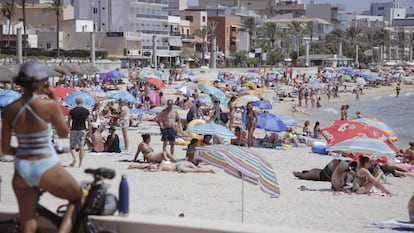Crackdown on British tourists’ phony food poisoning claims in Spain
New measures will be introduced before summer to put an end to a scam that has swindled Spanish hotels out of millions

The British Ministry of Justice has announced new rules to stop British holidaymakers in Spain from scamming tour operators with fake food poisoning claims.
Under the crackdown, a limit will be set on the legal costs that can be claimed in overseas package travel claims. This will stop claims management companies from seeking legal costs that are out of proportion to the damages sought – a loophole that has often pushed tour operators to settle out of court.
Claiming compensation for being sick on holiday, when you haven’t been, is fraud
British Justice Minister Rory Stewart
In a press release, the Ministry of Justice said the change “would mean tour operators would pay prescribed costs depending on the value of the claim and length of proceedings, making defense costs predictable and assisting tour operators to challenge bogus claims.”
According to court documents, phony food poisoning claims may have cheated Spanish hotels out of as much as €60 million since 2014. The scam took off in the summer of 2016, with one hotel chain receiving 273 claims requesting compensation for 700 people.
The scam was simple enough. The tourist buys a travel package with any travel agent and stays at a Spanish hotel that includes all meals in the price. Back in Britain after the vacation, the tourist uses a claims-management company to file a complaint against the company that organized the trip, alleging that the hotel meals made him/her ill.
Number of insurance claims increased by 500% between 2013 and 2016
Current British consumer laws barely require the claimant to produce any evidence. No doctor’s report is necessary, and claims may be filed up to three years after the event.
Since it is hard to prove that the client did not get sick, and faced with high legal fees if the case goes to court, the tour operator accepts the claim, then pass on the cost to the Spanish hotels as per their contract, in which the latter accept responsibility for all damages.
In 2017, the Spanish Civil Guard arrested seven British nationals for their involvement in the scam.
According to the Association of British Travel Agents (ABTA), the number of claims jumped from 5,000 in 2013 to 35,000 in 2016 – an increase of 500%.
“Claiming compensation for being sick on holiday, when you haven’t been, is fraud,” said Justice Minister Rory Stewart. “This behavior also tarnishes the reputation of British people abroad. That is why we are introducing measures to crack down on those who engage in this dishonest practice.”
The Ministry of Justice says the new rules will come into effect shortly – well before summer begins.
English version by Melissa Kitson.
Tu suscripción se está usando en otro dispositivo
¿Quieres añadir otro usuario a tu suscripción?
Si continúas leyendo en este dispositivo, no se podrá leer en el otro.
FlechaTu suscripción se está usando en otro dispositivo y solo puedes acceder a EL PAÍS desde un dispositivo a la vez.
Si quieres compartir tu cuenta, cambia tu suscripción a la modalidad Premium, así podrás añadir otro usuario. Cada uno accederá con su propia cuenta de email, lo que os permitirá personalizar vuestra experiencia en EL PAÍS.
¿Tienes una suscripción de empresa? Accede aquí para contratar más cuentas.
En el caso de no saber quién está usando tu cuenta, te recomendamos cambiar tu contraseña aquí.
Si decides continuar compartiendo tu cuenta, este mensaje se mostrará en tu dispositivo y en el de la otra persona que está usando tu cuenta de forma indefinida, afectando a tu experiencia de lectura. Puedes consultar aquí los términos y condiciones de la suscripción digital.








































